Unit 1 The Changing World 知识点整合学习
文档属性
| 名称 | Unit 1 The Changing World 知识点整合学习 | 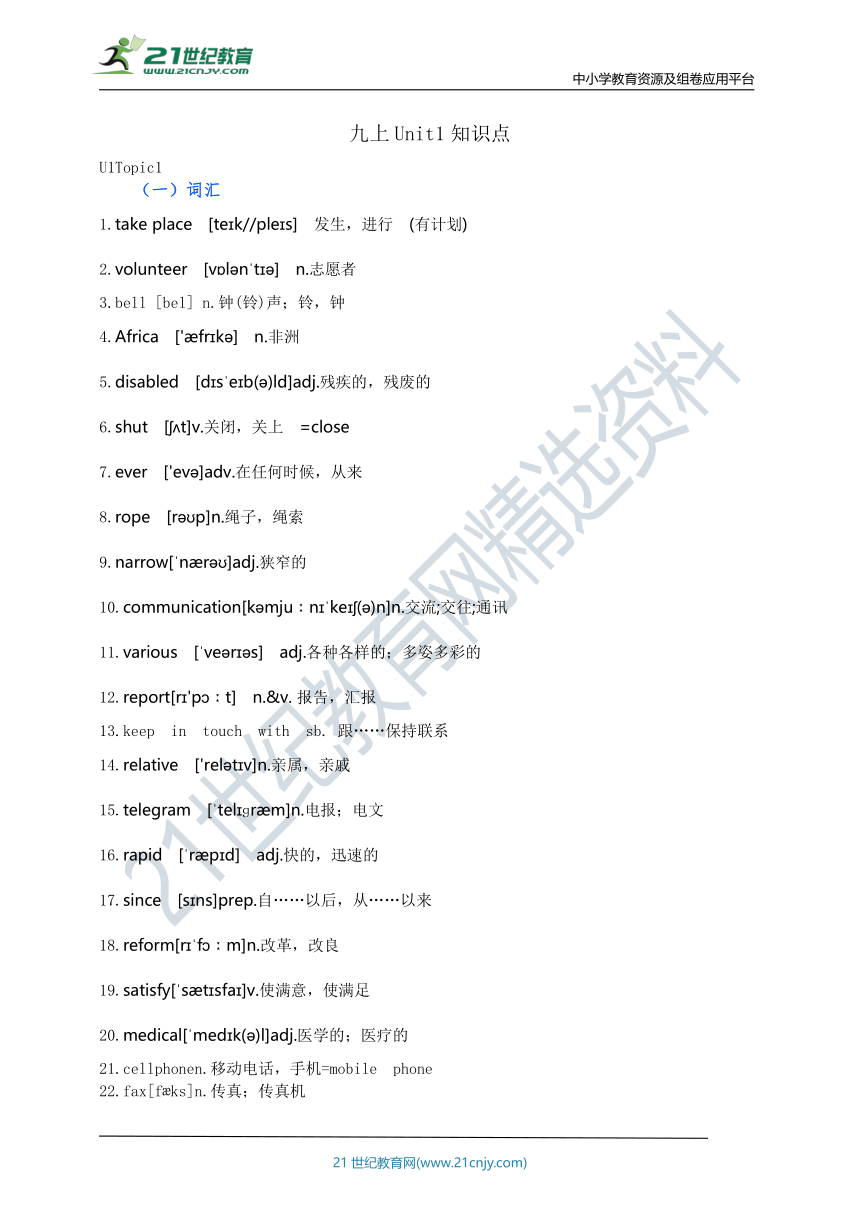 | |
| 格式 | doc | ||
| 文件大小 | 1.2MB | ||
| 资源类型 | 试卷 | ||
| 版本资源 | 仁爱科普版 | ||
| 科目 | 英语 | ||
| 更新时间 | 2020-08-20 14:35:15 | ||
图片预览

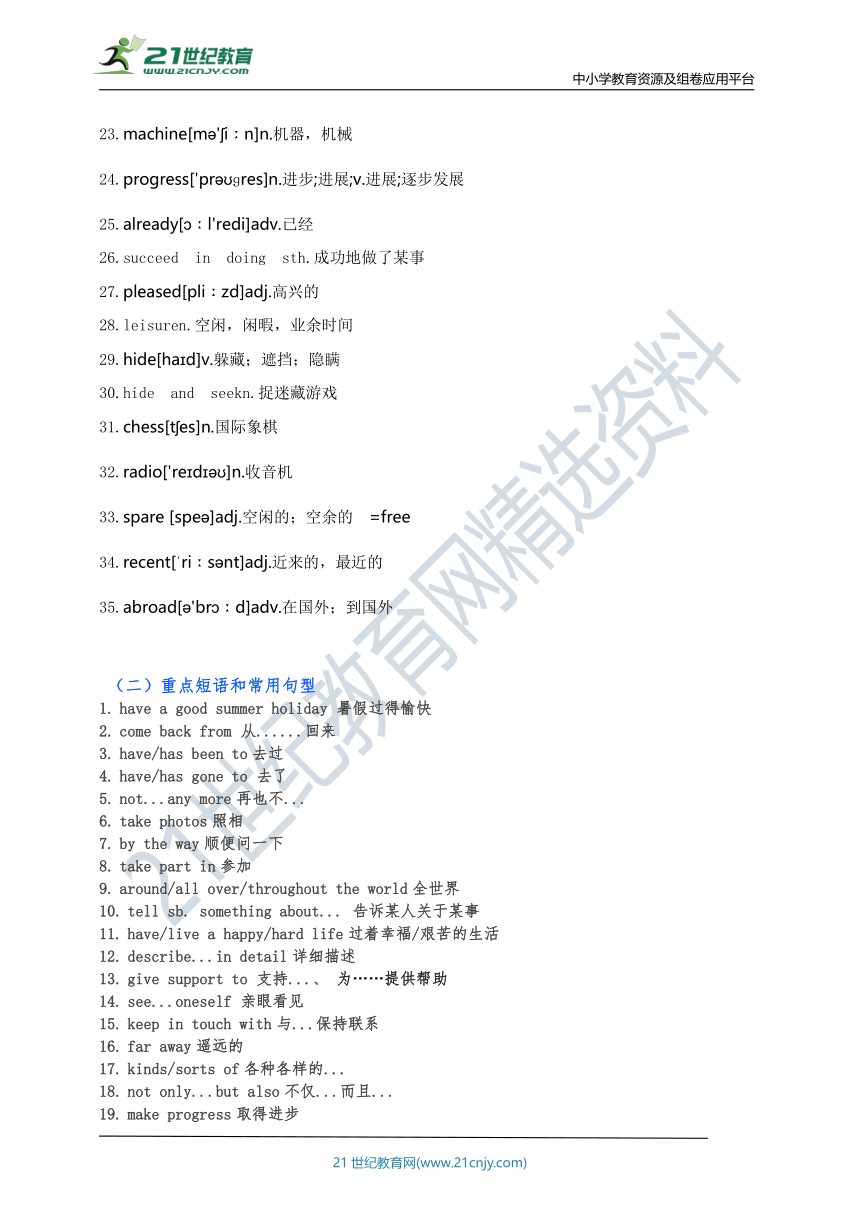
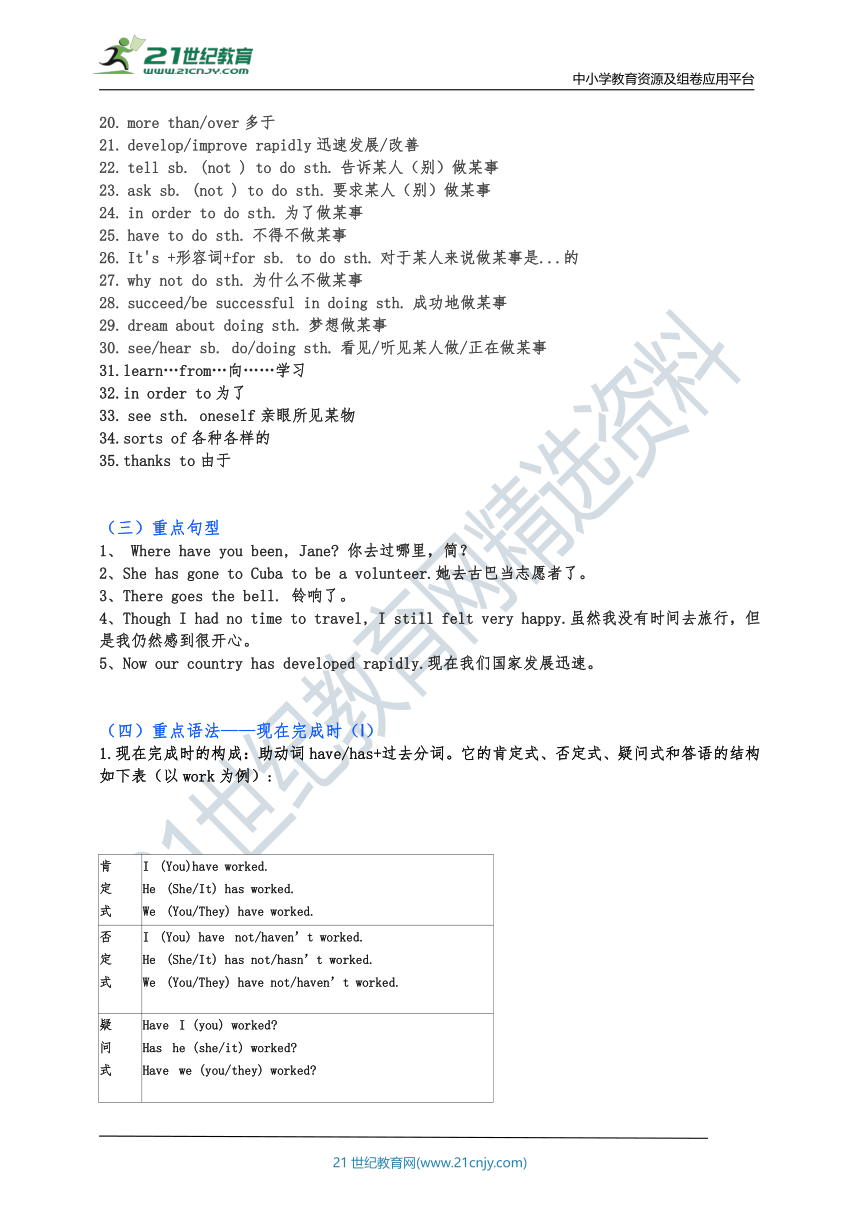
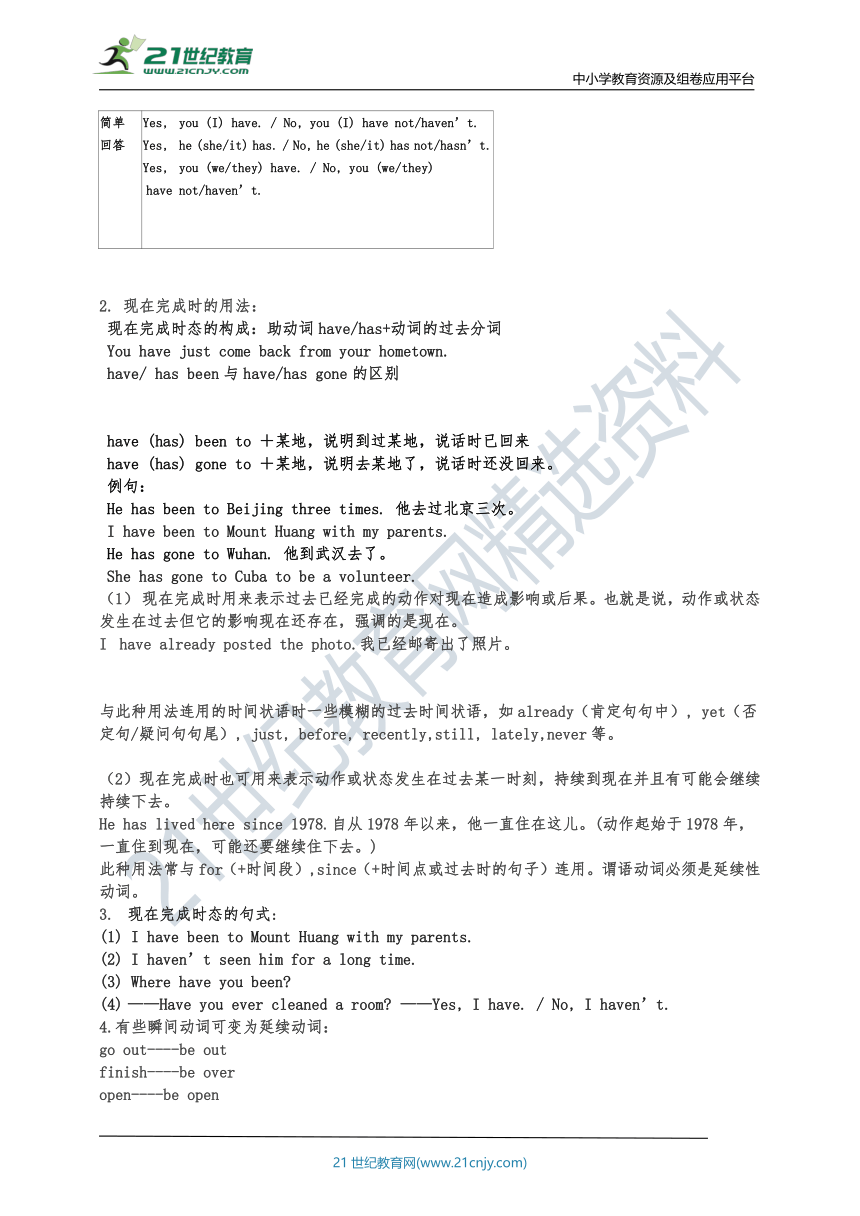
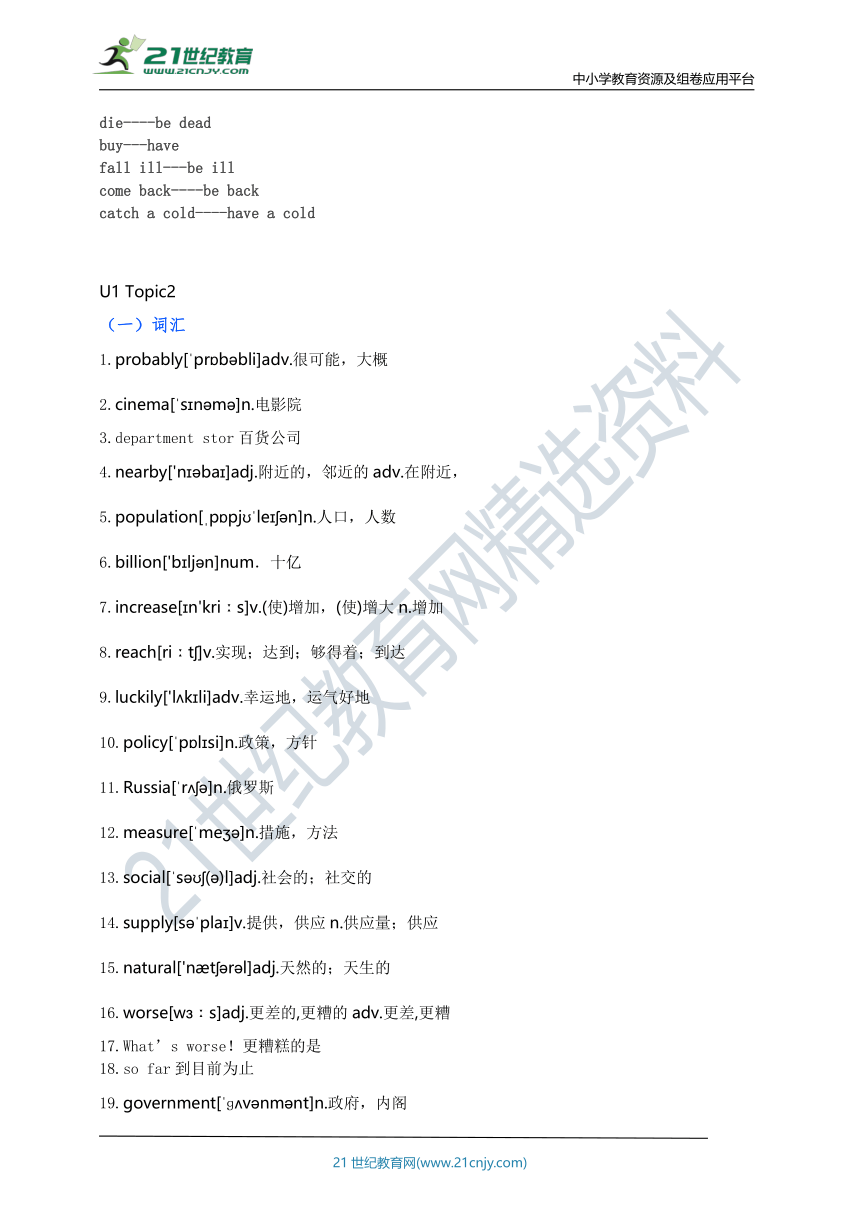
文档简介
中小学教育资源及组卷应用平台
九上Unit1知识点
U1Topic1
(一)词汇
1.take?place?[te?k//ple?s]?发生,进行?(有计划)
2.volunteer?[v?l?n?t??]?n.志愿者
3.bell [bel] n.钟(铃)声;铃,钟
4.Africa?['?fr?k?]?n.非洲
5.disabled?[d?s?e?b(?)ld]adj.残疾的,残废的
6.shut?[??t]v.关闭,关上?=close
7.ever?['ev?]adv.在任何时候,从来
8.rope?[r??p]n.绳子,绳索
9.narrow[?n?r??]adj.狭窄的
10.communication[k?mju?n??ke??(?)n]n.交流;交往;通讯
11.various?[?ve?r??s]?adj.各种各样的;多姿多彩的
12.report[r?'p??t]?n.&v.?报告,汇报
13.keep?in?touch?with?sb. 跟……保持联系
14.relative?['rel?t?v]n.亲属,亲戚
15.telegram?[?tel?ɡr?m]n.电报;电文
16.rapid?[?r?p?d]?adj.快的,迅速的
17.since?[s?ns]prep.自……以后,从……以来
18.reform[r??f??m]n.改革,改良
19.satisfy[?s?t?sfa?]v.使满意,使满足
20.medical[?med?k(?)l]adj.医学的;医疗的
21.cellphonen.移动电话,手机=mobile?phone
22.fax[f?ks]n.传真;传真机
23.machine[m?'?i?n]n.机器,机械
24.progress['pr??ɡres]n.进步;进展;v.进展;逐步发展
25.already[??l'redi]adv.已经
26.succeed?in?doing?sth.成功地做了某事
27.pleased[pli?zd]adj.高兴的
28.leisuren.空闲,闲暇,业余时间
29.hide[ha?d]v.躲藏;遮挡;隐瞒
30.hide?and?seekn.捉迷藏游戏
31.chess[t?es]n.国际象棋
32.radio['re?d???]n.收音机
33.spare?[spe?]adj.空闲的;空余的?=free
34.recent[?ri?s?nt]adj.近来的,最近的
35.abroad[?'br??d]adv.在国外;到国外
(二)重点短语和常用句型
1.?have a good summer holiday??暑假过得愉快
2.?come back from??从......回来
3.?have/has been to?去过
4.?have/has gone to??去了
5.?not...any more?再也不...??????????????????
6.?take photos?照相???????????????????????????????????
7.?by the way?顺便问一下
8.?take part in?参加
9.?around/all over/throughout the world?全世界
10.?tell sb. something about...??告诉某人关于某事
11.?have/live a happy/hard life?过着幸福/艰苦的生活
12.?describe...in detail?详细描述
13.?give support to??支持...、 为……提供帮助
14.?see...oneself??亲眼看见
15.?keep in touch with?与...保持联系
16.?far away?遥远的
17.?kinds/sorts of?各种各样的...
18.?not only...but also?不仅...而且...
19.?make progress?取得进步
20.?more than/over?多于
21.?develop/improve rapidly?迅速发展/改善
22.?tell sb. (not ) to do sth.?告诉某人(别)做某事
23.?ask sb. (not ) to do sth.?要求某人(别)做某事
24.?in order to do sth.?为了做某事
25.?have to do sth.?不得不做某事
26.?It's +形容词+for sb. to do sth.?对于某人来说做某事是...的
27.?why not do sth.?为什么不做某事
28.?succeed/be successful in doing sth.?成功地做某事
29.?dream about doing sth.?梦想做某事
30.?see/hear sb. do/doing sth.?看见/听见某人做/正在做某事
31.learn…from…向……学习
32.in order to为了??
33.?see sth. oneself?亲眼所见某物
34.sorts of各种各样的?
35.thanks to?由于
(三)重点句型
1、 Where have you been, Jane? 你去过哪里,简?
2、She has gone to Cuba to be a volunteer.她去古巴当志愿者了。
3、There goes the bell. 铃响了。
4、Though I had no time to travel, I still felt very happy.虽然我没有时间去旅行,但是我仍然感到很开心。
5、Now our country has developed rapidly.现在我们国家发展迅速。
(四)重点语法——现在完成时(?)?
1.现在完成时的构成:助动词have/has+过去分词。它的肯定式、否定式、疑问式和答语的结构如下表(以work为例):
?
肯 定
式 I ?(You)have worked.
He ?(She/It) has worked.
We ?(You/They) have worked.
否 定
式 I ?(You) have? not/haven’t worked.
He ?(She/It) has not/hasn’t worked.
We ?(You/They) have not/haven’t worked.
疑 问
式 Have ?I (you) worked?
Has ?he (she/it) worked?
Have ?we (you/they) worked?
简单 回答??? Yes, ?you (I) have. / No, you (I) have not/haven’t.
Yes, ?he (she/it) has. / No, he (she/it) has not/hasn’t.
Yes, ?you (we/they) have. / No, you (we/they)
?have not/haven’t.? ??
2. 现在完成时的用法:
现在完成时态的构成:助动词have/has+动词的过去分词
You have just come back from your hometown.
have/ has been与?have/has gone?的区别
have (has) been to +某地,说明到过某地,说话时已回来
have (has) gone to +某地,说明去某地了,说话时还没回来。
例句:?
He has been to Beijing three times. 他去过北京三次。
I have been to Mount Huang with my parents.
He has gone to Wuhan. 他到武汉去了。
She has gone to Cuba to be a volunteer.
(1)?现在完成时用来表示过去已经完成的动作对现在造成影响或后果。也就是说,动作或状态发生在过去但它的影响现在还存在,强调的是现在。?
I ?have already posted the photo.我已经邮寄出了照片。?
与此种用法连用的时间状语时一些模糊的过去时间状语,如already(肯定句句中), yet(否定句/疑问句句尾), just, before, recently,still, lately,never等。
?
(2)现在完成时也可用来表示动作或状态发生在过去某一时刻,持续到现在并且有可能会继续持续下去。?
He has lived here since 1978.自从1978年以来,他一直住在这儿。(动作起始于1978年,一直住到现在,可能还要继续住下去。)?
此种用法常与for(+时间段),since(+时间点或过去时的句子)连用。谓语动词必须是延续性动词。
3. ?现在完成时态的句式:
(1) I have been to Mount Huang with my parents.
(2) I haven’t seen him for a long time.
(3) Where have you been?
(4)?——Have you ever cleaned a room???——Yes, I have. / No, I haven’t.?
4.有些瞬间动词可变为延续动词:?
go out----be out
finish----be over
open----be open
die----be dead
buy---have
fall ill---be ill
come back----be back
catch a cold----have a cold
U1 Topic2
(一)词汇
1.probably[?pr?b?bli]adv.很可能,大概
2.cinema[?s?n?m?]n.电影院
3.department stor百货公司
4.nearby['n??ba?]adj.附近的,邻近的adv.在附近,
5.population[?p?pj??le???n]n.人口,人数
6.billion['b?lj?n]num.十亿
7.increase[?n'kri?s]v.(使)增加,(使)增大n.增加
8.reach[ri?t?]v.实现;达到;够得着;到达
9.luckily['l?k?li]adv.幸运地,运气好地
10.policy[?p?l?si]n.政策,方针
11.Russia[?r???]n.俄罗斯
12.measure[?me??]n.措施,方法
13.social[?s???(?)l]adj.社会的;社交的
14.supply[s??pla?]v.提供,供应n.供应量;供应
15.natural['n?t??r?l]adj.天然的;天生的
16.worse[w??s]adj.更差的,更糟的adv.更差,更糟
17.What’s worse!更糟糕的是
18.so far到目前为止
19.government[?ɡ?v?nm?nt]n.政府,内阁
20.thanks to sb./sth.幸亏,由于
21.paragraph[?p?r?ɡrɑ?f]n.段;段落
22.opportunity[ /??p??tju?n?ti ]n.机会,时机
23.newbornadj.新生的,初生的
24.percent[p??sent]n.百分之······
25.offer['??f?]v.提供(东西或机会);主动提出
26.surround[s??ra?nd]v.围绕,环绕
27.garbage[?ɡɑ?b?d?]n.(生活)垃圾,废物,垃圾场
28.discourage[d??sk?r?d?]v.阻拦,阻止;使灰心
29.local[?l??k(?)l]adj.当地的,本地的
30.capital['k?p?tl]n.首都;资本
31.huge[hju?d?]adj.巨大的,极多的
32.market['mɑ?k?t]n.集市,市场
33.transportation[?tr?nsp?'te???n]n.运输,运送
34.excellent['eks?l?nt]adj.极好的,优秀的
(二)重点短语和句型
1. get lost 迷路
2. a couple of 一些,几个
3. with the development of 随着...的发展
4. with the help of... 在...的帮助下
5. one of the+形容词最高级+名词复数 其中之一/最...的其中之一
6. each other 互相
7. call/ring sb.up 给某人打电话
8. at least 至少
9. sth. happen to sb. 某人发生某事
10. What happened to sb? 某人发生某事?
11. take place 发生
12. because of 因为,由于
13. be strict with sb./in sth. 对某人/某事严格要求
14. carry out 执行
15. thousands/millions/hundreds of 成千上万/无数的/成百上千...
16. two thousand/million/hundred 两千/百万/百(具体数字后面不加s)
17. half of... 一半...
18. two thirds 三分之二19. be short of 短缺...
20. so far 到目前为止
21. be known/famous for 因...而闻名
22. be known/famous as 作为...而闻名
23. thanks to 幸亏...
24. have a long way to go 有很长的路要走
25. a town called... 一个叫做...的镇
26. fewer than/less than 少于
27. places of interest 名胜古迹
28. be interested in 对...感兴趣
29. such as 例如...
30. look/smell/sound/feel/taste+形容词 看/闻/听/摸/尝起来...
31. such a/an+形容词+sb./sth 如此...的人/物
32. take sb. to sp 带某人去某地
33. keep up with 赶上
34. have fun doing sth. 做某事很愉快
35. have a population of... 有...的人口
36. What's the population of...? ...有多少人口?
37. want to do sth. 想要做某事
38. hate to do sth 讨厌做某事
39. take measures to do sth. 采取措施做某事
40. have(no)chance/time to do sth. 有机会/时间做某事
41. used to do sth. 过去常常做某事
42. be used to do sth. 被用来做某事
43. be/get used to doing sth. 习惯做某事
44. work well in doing sth. 在...方面起到显著作用
45.each other 彼此
46.at least 至少
47.take place发生
48.because of 因为
49.be strict with sb. 对某人严格要求
50.be short of 缺乏
51.take measures to do sth.采取措施做某事
52.be known as… 作为……而著名
53.work well in doing…在……方面起作用
54.a couple of 一些
55.keep up with赶上,跟上
(三).重点句型
1. Have you found him yet? 你已经找到他了吗?
2. ——I really hate to go shopping. 我的确讨厌购物。
——So do I.我也如此。
3. But it seems that their living conditions were not very good.
但是似乎他们的生活条件不太好。
4. But great changes have already taken place in China recently.但是近来中国已发生了巨大的变化。
5. Because of the one-child policy, now most families have only one child.由于我国独生子女政策的实行,现在大部分家庭只有一个孩子。
6. What’s the population of the U.S.A.?美国的人口是多少?
7. ——What’s more, the population in developing countries is growing faster. 而且,发展中国家的人口在更快地发展。
——So it is. 的确如此。
8. Our government has taken many measures to control the population.
我们的政府已采取了许多控制人口的措施。
(四)现在完成时(Ⅱ)
1.现在完成时的用法:表示过去某一时间发生的动作或存在的状态,对现在仍有影响。
I have just posted the letter. 我刚把信邮寄了。
She has lost her watch. 她弄丢了手表。
2.现在完成时可以和不明确指出时间的状语连用,如already, yet,just, before, ever, lately, once,never, recently. 等。
1. I have just called you.
2. ——Have you ever been to France?
——No, I’ve never been to any European countries.
3. ——Have you seen him yet?
——Yes, I have seen him already.
4.Have you heard from your friend lately?
你最近收到你朋友的来信了吗?
3.现在完成时也可以和包括现在在内的时间状语连用。如this week, this morning, today, thisyear等。
They have moved three times this year.
今年他们已经搬了三次家。
4.现在完成时不能和明确表示过去时间的状语连用。
如yesterday, last week, in 1999, two days ago,just now, when I came in等。
U1Topic3
(一)词汇
1.in fact[?n'f?kt]事实上,其实= as a matter of fact
2.block[bl?k]n.街道(区);(方形平面)大块
3.artist['ɑ?t?st]n.艺术家,(尤指)画家
4.millions of大量;数以百万计
5.visitor [n.游客;来访者;参观者
6.industry[??nd?stri]n.行业;工业
7.chemistry['kem?stri]n.化学;化学物
8.term[t??m]n.学期;词语;措辞
9.program['pr??gr?m]n.计划,方案;节目
10.homeless['h??ml?s]adj.无家的
11.manage[?m?n?d?]v.完成;能解决;经营
12.treatment[?tri?tm?nt]n.疗法;治疗
13.training['tre?n??]n.训练,培训
14.immediately[??mi?d??tli]adv.立刻,立即
15.secretary[?sekr?tri]n.秘书
16.helpern.帮手,助手
17.club[kl?b]n.俱乐部
18.engineer[?end??'n??]n.工程师;技师
19.wound[wu?nd]n.创伤,伤口;v.伤,伤害
20.basic['be?s?k]adj.基本的,基础的
21.human['hju?m?n]adj.人的n.人=human beings
22.value[?v?lju?]v.重视,珍视n.价值
23.period[?p??r??d]n.一段时间,时期
24.shelter[??elt?]n.收容所;遮蔽物
25.earn[??n]n.挣钱;挣得,赢得
26.drug[dr?ɡ]n.毒品;药,药物
27.mental[?ment(?)l]adj.精神健康的;思想的
28.on purpose故意,有意地
29.whatever[w?t?ev?]pron.无论什么,不管什么
30.effect[??fekt]n.影响,结果;效果
31.steal[st??l]v.偷,窃取
32.support[s??p??t]v.帮助,援助;支持
33.phrase[fre?z]n.短语,词组
34.according to据······所说,按······所报道
35.contextn.上下文;语境;背景
36.laborern.体力劳动者,劳工,工人
37.cruel[?kru??l]adj.残酷的,冷酷的
38.project[?pr?d?ekt]n.专题研究;项目;方案
39.aid[e?d][e?d]
40.primary[?pra?m?ri]adj.小学教育的;主要的;
41.contribution[?k?ntr??bju???n]n.贡献;捐款
42.moral[?m?r(?)l]adj.道德(上)的
43.development[d??vel?pm?nt]n.发展;开发
44.respect[r??spekt]v.尊敬,尊重
45.importance[?m?p??t(?)ns]n.重要性,重要
46.continue[k?n?t?nju?]v.持续,继续做
47.college[?k?l?d?]n.(美)大学;(英)学院
(二)重点短语
1. with the money 用这些钱
2. so that 为了,以致于
3. so...that... 如此...以致于...
4. in fact/as a matter of fact 事实上
5. come for a visit 来参观
6. in need 在困难时
7. decide on sth. 决定某事
8. provide sth. for sb./provide sb. with sth. 为某人提供某物
9. feel good about... 对...有信心
10 lend sth. to sb/lend sb. sth. 把某物借给某人
11. borrow sth. from sb. 向某人借某物
12. at the same time 与此同时
13. talk on the phone 在电话中交谈
14. take drugs 吸毒15. pay for 付款
16. buy sth. for sb. 给某人买某物
17. at home and abroad 在国内外
18. send sb. to sp. 送某人去某地
19. send for sb. 派人去请某人
20. aim to do sth. 目的是做某事
21. decide(not)to do sth. 决定(不)做某事
22. finish doing 结束做某事
23. How do you like.../What do you think of...? 你觉得...怎么样?
24. sb.spend st.in doing sth=It takes sb.st. to do sth. 某人花费...时间做某事
25. sb.spend some money on sth.=sb.pay some money for sth. 某人花费...钱买某物
26. so+be/助动词/情态动词+主语 表示后者情况与前者一样(表肯定)
neither/nor+be/助动词/情态动词+主语 表示后者情况与前者一样(表否定)
27. so +主语+/be/助动词/情态动词 表示的确如此
28.get used to sth./ doing sth. 习惯于……
29.as a matter of fact 事实上
30.live a hard life 过着艰难的生活
31.in need of 需要
32.provide sb. with sth.= provide sth. for sb.提供某物给某人
33.one’s success in doing sth. 成功完成某事
34.obey strict rules 遵守严格的规则
35.in the past sixteen years 在过去的十六年里
36.at home and abroad 在国内外
37.pay for 付款
38.thousands of 成千上万的
(三)重点句型
1.You must come for a visit. 请你一定来参观。
2.Well, once they find people in deed, they decide on suitable ways to help them.他们一旦发现有人需要帮助, 就选定适当的方式来帮助他们。
3.I think it is important for these people to feel good about themselves.我认为对于这些人来说,自我感觉良好是重要的。
4.The world has changed for the better.世界变得更加美好。
5.With the money, it has built thousands of schools and trained 2,300 teachers.它用这钱修建了数千所学校和图书馆并且培训了2300名教师。
(四)语法
1、现在完成时(Ⅲ)
(1)现在完成时表示从过去某一时刻延续到现在的动作或状态,常与for,since引导的状语连用。for+一段时间,since+过去时间点或从句(从句的谓语动词用过去式)。例句:
I have lived here for twenty years.
我住在这里已有20年了。
We have built many factories since 1985.
自1985年以来,我们建了许多工厂。
He has always helped me with my English since he came here.
自从他到这里以后,他总是帮助我学习英语。
You have been in New York for a long time.
The city has improved a lot since I came here a few years ago.
(2)有的动词所表示的动作不是瞬间就可以完成的,要持续一段时间,这样的动词叫延续性动词。不能延续下去的动词,叫非延续性动词或瞬间动词。如:buy,borrow等,这些动词在现在完成时的句子中可改为相应的表示延续性的词或短语来与表示一段时间的状语连用。如:buy→have,borrow→keep, come→be,join→be, die→be dead, begin→be on等。
例句
He joined the army two years ago.他两年前就参军了。(同义句)
→He has been in the army for two years.
→He has been a soldier for twoyears.
2.构词法:
合成词: home +work= homework
_21?????????è?????(www.21cnjy.com)_
九上Unit1知识点
U1Topic1
(一)词汇
1.take?place?[te?k//ple?s]?发生,进行?(有计划)
2.volunteer?[v?l?n?t??]?n.志愿者
3.bell [bel] n.钟(铃)声;铃,钟
4.Africa?['?fr?k?]?n.非洲
5.disabled?[d?s?e?b(?)ld]adj.残疾的,残废的
6.shut?[??t]v.关闭,关上?=close
7.ever?['ev?]adv.在任何时候,从来
8.rope?[r??p]n.绳子,绳索
9.narrow[?n?r??]adj.狭窄的
10.communication[k?mju?n??ke??(?)n]n.交流;交往;通讯
11.various?[?ve?r??s]?adj.各种各样的;多姿多彩的
12.report[r?'p??t]?n.&v.?报告,汇报
13.keep?in?touch?with?sb. 跟……保持联系
14.relative?['rel?t?v]n.亲属,亲戚
15.telegram?[?tel?ɡr?m]n.电报;电文
16.rapid?[?r?p?d]?adj.快的,迅速的
17.since?[s?ns]prep.自……以后,从……以来
18.reform[r??f??m]n.改革,改良
19.satisfy[?s?t?sfa?]v.使满意,使满足
20.medical[?med?k(?)l]adj.医学的;医疗的
21.cellphonen.移动电话,手机=mobile?phone
22.fax[f?ks]n.传真;传真机
23.machine[m?'?i?n]n.机器,机械
24.progress['pr??ɡres]n.进步;进展;v.进展;逐步发展
25.already[??l'redi]adv.已经
26.succeed?in?doing?sth.成功地做了某事
27.pleased[pli?zd]adj.高兴的
28.leisuren.空闲,闲暇,业余时间
29.hide[ha?d]v.躲藏;遮挡;隐瞒
30.hide?and?seekn.捉迷藏游戏
31.chess[t?es]n.国际象棋
32.radio['re?d???]n.收音机
33.spare?[spe?]adj.空闲的;空余的?=free
34.recent[?ri?s?nt]adj.近来的,最近的
35.abroad[?'br??d]adv.在国外;到国外
(二)重点短语和常用句型
1.?have a good summer holiday??暑假过得愉快
2.?come back from??从......回来
3.?have/has been to?去过
4.?have/has gone to??去了
5.?not...any more?再也不...??????????????????
6.?take photos?照相???????????????????????????????????
7.?by the way?顺便问一下
8.?take part in?参加
9.?around/all over/throughout the world?全世界
10.?tell sb. something about...??告诉某人关于某事
11.?have/live a happy/hard life?过着幸福/艰苦的生活
12.?describe...in detail?详细描述
13.?give support to??支持...、 为……提供帮助
14.?see...oneself??亲眼看见
15.?keep in touch with?与...保持联系
16.?far away?遥远的
17.?kinds/sorts of?各种各样的...
18.?not only...but also?不仅...而且...
19.?make progress?取得进步
20.?more than/over?多于
21.?develop/improve rapidly?迅速发展/改善
22.?tell sb. (not ) to do sth.?告诉某人(别)做某事
23.?ask sb. (not ) to do sth.?要求某人(别)做某事
24.?in order to do sth.?为了做某事
25.?have to do sth.?不得不做某事
26.?It's +形容词+for sb. to do sth.?对于某人来说做某事是...的
27.?why not do sth.?为什么不做某事
28.?succeed/be successful in doing sth.?成功地做某事
29.?dream about doing sth.?梦想做某事
30.?see/hear sb. do/doing sth.?看见/听见某人做/正在做某事
31.learn…from…向……学习
32.in order to为了??
33.?see sth. oneself?亲眼所见某物
34.sorts of各种各样的?
35.thanks to?由于
(三)重点句型
1、 Where have you been, Jane? 你去过哪里,简?
2、She has gone to Cuba to be a volunteer.她去古巴当志愿者了。
3、There goes the bell. 铃响了。
4、Though I had no time to travel, I still felt very happy.虽然我没有时间去旅行,但是我仍然感到很开心。
5、Now our country has developed rapidly.现在我们国家发展迅速。
(四)重点语法——现在完成时(?)?
1.现在完成时的构成:助动词have/has+过去分词。它的肯定式、否定式、疑问式和答语的结构如下表(以work为例):
?
肯 定
式 I ?(You)have worked.
He ?(She/It) has worked.
We ?(You/They) have worked.
否 定
式 I ?(You) have? not/haven’t worked.
He ?(She/It) has not/hasn’t worked.
We ?(You/They) have not/haven’t worked.
疑 问
式 Have ?I (you) worked?
Has ?he (she/it) worked?
Have ?we (you/they) worked?
简单 回答??? Yes, ?you (I) have. / No, you (I) have not/haven’t.
Yes, ?he (she/it) has. / No, he (she/it) has not/hasn’t.
Yes, ?you (we/they) have. / No, you (we/they)
?have not/haven’t.? ??
2. 现在完成时的用法:
现在完成时态的构成:助动词have/has+动词的过去分词
You have just come back from your hometown.
have/ has been与?have/has gone?的区别
have (has) been to +某地,说明到过某地,说话时已回来
have (has) gone to +某地,说明去某地了,说话时还没回来。
例句:?
He has been to Beijing three times. 他去过北京三次。
I have been to Mount Huang with my parents.
He has gone to Wuhan. 他到武汉去了。
She has gone to Cuba to be a volunteer.
(1)?现在完成时用来表示过去已经完成的动作对现在造成影响或后果。也就是说,动作或状态发生在过去但它的影响现在还存在,强调的是现在。?
I ?have already posted the photo.我已经邮寄出了照片。?
与此种用法连用的时间状语时一些模糊的过去时间状语,如already(肯定句句中), yet(否定句/疑问句句尾), just, before, recently,still, lately,never等。
?
(2)现在完成时也可用来表示动作或状态发生在过去某一时刻,持续到现在并且有可能会继续持续下去。?
He has lived here since 1978.自从1978年以来,他一直住在这儿。(动作起始于1978年,一直住到现在,可能还要继续住下去。)?
此种用法常与for(+时间段),since(+时间点或过去时的句子)连用。谓语动词必须是延续性动词。
3. ?现在完成时态的句式:
(1) I have been to Mount Huang with my parents.
(2) I haven’t seen him for a long time.
(3) Where have you been?
(4)?——Have you ever cleaned a room???——Yes, I have. / No, I haven’t.?
4.有些瞬间动词可变为延续动词:?
go out----be out
finish----be over
open----be open
die----be dead
buy---have
fall ill---be ill
come back----be back
catch a cold----have a cold
U1 Topic2
(一)词汇
1.probably[?pr?b?bli]adv.很可能,大概
2.cinema[?s?n?m?]n.电影院
3.department stor百货公司
4.nearby['n??ba?]adj.附近的,邻近的adv.在附近,
5.population[?p?pj??le???n]n.人口,人数
6.billion['b?lj?n]num.十亿
7.increase[?n'kri?s]v.(使)增加,(使)增大n.增加
8.reach[ri?t?]v.实现;达到;够得着;到达
9.luckily['l?k?li]adv.幸运地,运气好地
10.policy[?p?l?si]n.政策,方针
11.Russia[?r???]n.俄罗斯
12.measure[?me??]n.措施,方法
13.social[?s???(?)l]adj.社会的;社交的
14.supply[s??pla?]v.提供,供应n.供应量;供应
15.natural['n?t??r?l]adj.天然的;天生的
16.worse[w??s]adj.更差的,更糟的adv.更差,更糟
17.What’s worse!更糟糕的是
18.so far到目前为止
19.government[?ɡ?v?nm?nt]n.政府,内阁
20.thanks to sb./sth.幸亏,由于
21.paragraph[?p?r?ɡrɑ?f]n.段;段落
22.opportunity[ /??p??tju?n?ti ]n.机会,时机
23.newbornadj.新生的,初生的
24.percent[p??sent]n.百分之······
25.offer['??f?]v.提供(东西或机会);主动提出
26.surround[s??ra?nd]v.围绕,环绕
27.garbage[?ɡɑ?b?d?]n.(生活)垃圾,废物,垃圾场
28.discourage[d??sk?r?d?]v.阻拦,阻止;使灰心
29.local[?l??k(?)l]adj.当地的,本地的
30.capital['k?p?tl]n.首都;资本
31.huge[hju?d?]adj.巨大的,极多的
32.market['mɑ?k?t]n.集市,市场
33.transportation[?tr?nsp?'te???n]n.运输,运送
34.excellent['eks?l?nt]adj.极好的,优秀的
(二)重点短语和句型
1. get lost 迷路
2. a couple of 一些,几个
3. with the development of 随着...的发展
4. with the help of... 在...的帮助下
5. one of the+形容词最高级+名词复数 其中之一/最...的其中之一
6. each other 互相
7. call/ring sb.up 给某人打电话
8. at least 至少
9. sth. happen to sb. 某人发生某事
10. What happened to sb? 某人发生某事?
11. take place 发生
12. because of 因为,由于
13. be strict with sb./in sth. 对某人/某事严格要求
14. carry out 执行
15. thousands/millions/hundreds of 成千上万/无数的/成百上千...
16. two thousand/million/hundred 两千/百万/百(具体数字后面不加s)
17. half of... 一半...
18. two thirds 三分之二19. be short of 短缺...
20. so far 到目前为止
21. be known/famous for 因...而闻名
22. be known/famous as 作为...而闻名
23. thanks to 幸亏...
24. have a long way to go 有很长的路要走
25. a town called... 一个叫做...的镇
26. fewer than/less than 少于
27. places of interest 名胜古迹
28. be interested in 对...感兴趣
29. such as 例如...
30. look/smell/sound/feel/taste+形容词 看/闻/听/摸/尝起来...
31. such a/an+形容词+sb./sth 如此...的人/物
32. take sb. to sp 带某人去某地
33. keep up with 赶上
34. have fun doing sth. 做某事很愉快
35. have a population of... 有...的人口
36. What's the population of...? ...有多少人口?
37. want to do sth. 想要做某事
38. hate to do sth 讨厌做某事
39. take measures to do sth. 采取措施做某事
40. have(no)chance/time to do sth. 有机会/时间做某事
41. used to do sth. 过去常常做某事
42. be used to do sth. 被用来做某事
43. be/get used to doing sth. 习惯做某事
44. work well in doing sth. 在...方面起到显著作用
45.each other 彼此
46.at least 至少
47.take place发生
48.because of 因为
49.be strict with sb. 对某人严格要求
50.be short of 缺乏
51.take measures to do sth.采取措施做某事
52.be known as… 作为……而著名
53.work well in doing…在……方面起作用
54.a couple of 一些
55.keep up with赶上,跟上
(三).重点句型
1. Have you found him yet? 你已经找到他了吗?
2. ——I really hate to go shopping. 我的确讨厌购物。
——So do I.我也如此。
3. But it seems that their living conditions were not very good.
但是似乎他们的生活条件不太好。
4. But great changes have already taken place in China recently.但是近来中国已发生了巨大的变化。
5. Because of the one-child policy, now most families have only one child.由于我国独生子女政策的实行,现在大部分家庭只有一个孩子。
6. What’s the population of the U.S.A.?美国的人口是多少?
7. ——What’s more, the population in developing countries is growing faster. 而且,发展中国家的人口在更快地发展。
——So it is. 的确如此。
8. Our government has taken many measures to control the population.
我们的政府已采取了许多控制人口的措施。
(四)现在完成时(Ⅱ)
1.现在完成时的用法:表示过去某一时间发生的动作或存在的状态,对现在仍有影响。
I have just posted the letter. 我刚把信邮寄了。
She has lost her watch. 她弄丢了手表。
2.现在完成时可以和不明确指出时间的状语连用,如already, yet,just, before, ever, lately, once,never, recently. 等。
1. I have just called you.
2. ——Have you ever been to France?
——No, I’ve never been to any European countries.
3. ——Have you seen him yet?
——Yes, I have seen him already.
4.Have you heard from your friend lately?
你最近收到你朋友的来信了吗?
3.现在完成时也可以和包括现在在内的时间状语连用。如this week, this morning, today, thisyear等。
They have moved three times this year.
今年他们已经搬了三次家。
4.现在完成时不能和明确表示过去时间的状语连用。
如yesterday, last week, in 1999, two days ago,just now, when I came in等。
U1Topic3
(一)词汇
1.in fact[?n'f?kt]事实上,其实= as a matter of fact
2.block[bl?k]n.街道(区);(方形平面)大块
3.artist['ɑ?t?st]n.艺术家,(尤指)画家
4.millions of大量;数以百万计
5.visitor [n.游客;来访者;参观者
6.industry[??nd?stri]n.行业;工业
7.chemistry['kem?stri]n.化学;化学物
8.term[t??m]n.学期;词语;措辞
9.program['pr??gr?m]n.计划,方案;节目
10.homeless['h??ml?s]adj.无家的
11.manage[?m?n?d?]v.完成;能解决;经营
12.treatment[?tri?tm?nt]n.疗法;治疗
13.training['tre?n??]n.训练,培训
14.immediately[??mi?d??tli]adv.立刻,立即
15.secretary[?sekr?tri]n.秘书
16.helpern.帮手,助手
17.club[kl?b]n.俱乐部
18.engineer[?end??'n??]n.工程师;技师
19.wound[wu?nd]n.创伤,伤口;v.伤,伤害
20.basic['be?s?k]adj.基本的,基础的
21.human['hju?m?n]adj.人的n.人=human beings
22.value[?v?lju?]v.重视,珍视n.价值
23.period[?p??r??d]n.一段时间,时期
24.shelter[??elt?]n.收容所;遮蔽物
25.earn[??n]n.挣钱;挣得,赢得
26.drug[dr?ɡ]n.毒品;药,药物
27.mental[?ment(?)l]adj.精神健康的;思想的
28.on purpose故意,有意地
29.whatever[w?t?ev?]pron.无论什么,不管什么
30.effect[??fekt]n.影响,结果;效果
31.steal[st??l]v.偷,窃取
32.support[s??p??t]v.帮助,援助;支持
33.phrase[fre?z]n.短语,词组
34.according to据······所说,按······所报道
35.contextn.上下文;语境;背景
36.laborern.体力劳动者,劳工,工人
37.cruel[?kru??l]adj.残酷的,冷酷的
38.project[?pr?d?ekt]n.专题研究;项目;方案
39.aid[e?d][e?d]
40.primary[?pra?m?ri]adj.小学教育的;主要的;
41.contribution[?k?ntr??bju???n]n.贡献;捐款
42.moral[?m?r(?)l]adj.道德(上)的
43.development[d??vel?pm?nt]n.发展;开发
44.respect[r??spekt]v.尊敬,尊重
45.importance[?m?p??t(?)ns]n.重要性,重要
46.continue[k?n?t?nju?]v.持续,继续做
47.college[?k?l?d?]n.(美)大学;(英)学院
(二)重点短语
1. with the money 用这些钱
2. so that 为了,以致于
3. so...that... 如此...以致于...
4. in fact/as a matter of fact 事实上
5. come for a visit 来参观
6. in need 在困难时
7. decide on sth. 决定某事
8. provide sth. for sb./provide sb. with sth. 为某人提供某物
9. feel good about... 对...有信心
10 lend sth. to sb/lend sb. sth. 把某物借给某人
11. borrow sth. from sb. 向某人借某物
12. at the same time 与此同时
13. talk on the phone 在电话中交谈
14. take drugs 吸毒15. pay for 付款
16. buy sth. for sb. 给某人买某物
17. at home and abroad 在国内外
18. send sb. to sp. 送某人去某地
19. send for sb. 派人去请某人
20. aim to do sth. 目的是做某事
21. decide(not)to do sth. 决定(不)做某事
22. finish doing 结束做某事
23. How do you like.../What do you think of...? 你觉得...怎么样?
24. sb.spend st.in doing sth=It takes sb.st. to do sth. 某人花费...时间做某事
25. sb.spend some money on sth.=sb.pay some money for sth. 某人花费...钱买某物
26. so+be/助动词/情态动词+主语 表示后者情况与前者一样(表肯定)
neither/nor+be/助动词/情态动词+主语 表示后者情况与前者一样(表否定)
27. so +主语+/be/助动词/情态动词 表示的确如此
28.get used to sth./ doing sth. 习惯于……
29.as a matter of fact 事实上
30.live a hard life 过着艰难的生活
31.in need of 需要
32.provide sb. with sth.= provide sth. for sb.提供某物给某人
33.one’s success in doing sth. 成功完成某事
34.obey strict rules 遵守严格的规则
35.in the past sixteen years 在过去的十六年里
36.at home and abroad 在国内外
37.pay for 付款
38.thousands of 成千上万的
(三)重点句型
1.You must come for a visit. 请你一定来参观。
2.Well, once they find people in deed, they decide on suitable ways to help them.他们一旦发现有人需要帮助, 就选定适当的方式来帮助他们。
3.I think it is important for these people to feel good about themselves.我认为对于这些人来说,自我感觉良好是重要的。
4.The world has changed for the better.世界变得更加美好。
5.With the money, it has built thousands of schools and trained 2,300 teachers.它用这钱修建了数千所学校和图书馆并且培训了2300名教师。
(四)语法
1、现在完成时(Ⅲ)
(1)现在完成时表示从过去某一时刻延续到现在的动作或状态,常与for,since引导的状语连用。for+一段时间,since+过去时间点或从句(从句的谓语动词用过去式)。例句:
I have lived here for twenty years.
我住在这里已有20年了。
We have built many factories since 1985.
自1985年以来,我们建了许多工厂。
He has always helped me with my English since he came here.
自从他到这里以后,他总是帮助我学习英语。
You have been in New York for a long time.
The city has improved a lot since I came here a few years ago.
(2)有的动词所表示的动作不是瞬间就可以完成的,要持续一段时间,这样的动词叫延续性动词。不能延续下去的动词,叫非延续性动词或瞬间动词。如:buy,borrow等,这些动词在现在完成时的句子中可改为相应的表示延续性的词或短语来与表示一段时间的状语连用。如:buy→have,borrow→keep, come→be,join→be, die→be dead, begin→be on等。
例句
He joined the army two years ago.他两年前就参军了。(同义句)
→He has been in the army for two years.
→He has been a soldier for twoyears.
2.构词法:
合成词: home +work= homework
_21?????????è?????(www.21cnjy.com)_
同课章节目录
- Unit 1 The Changing World
- Topic 1 Our country has developed rapidly.
- Topic 2 The population in developing countries is
- Topic 3 The world has changed for the better.
- Unit 2 Saving the earth.
- Topic 1 Pollution has causes too many problems.
- Topic 2 All these problems are very serious.
- Topic 3 What can we do to protect the environment
- Unit 3 English around the World
- Topic 1 English is widely spoken around the world.
- Topic 2 Some things usually have different meaning
- Topic 3 Could you give us some advice on how to l
- Unit 4 Amazing Science
- Topic 1 When was it invented?
- Topic 2 I'm excited about the things that will be
- Topic 3 China is the third nation that sent a pers
